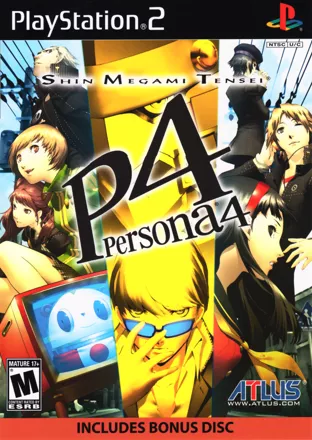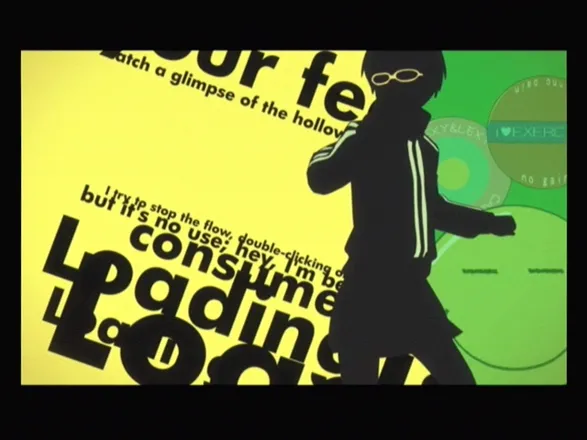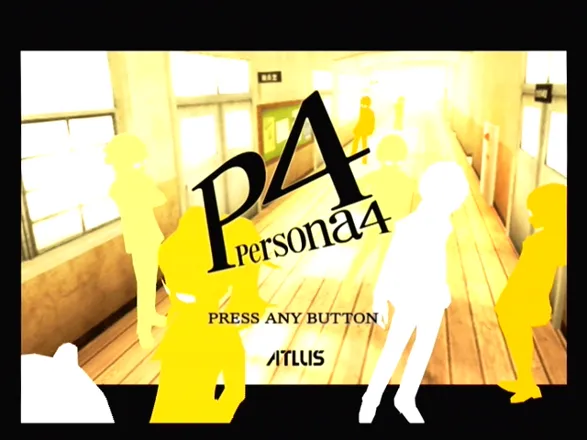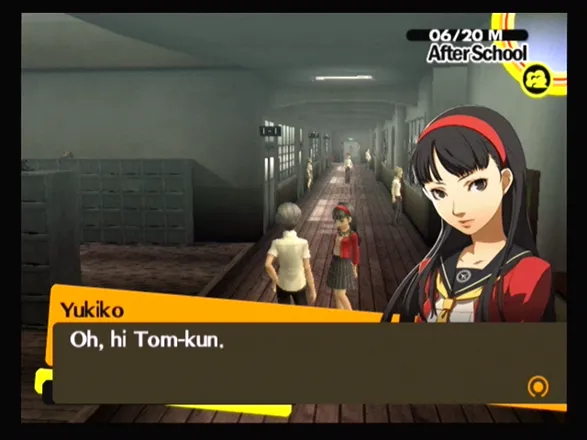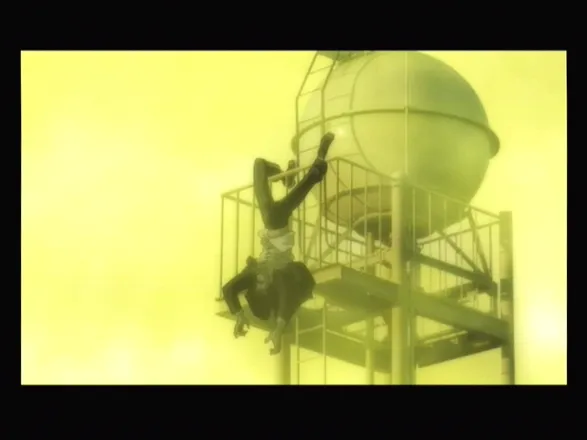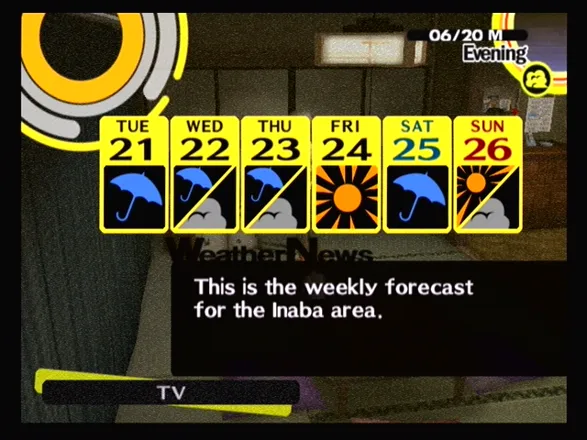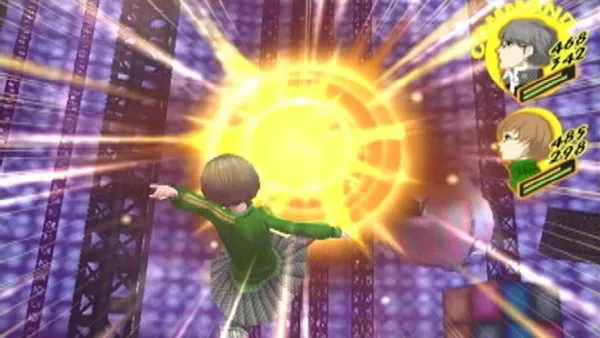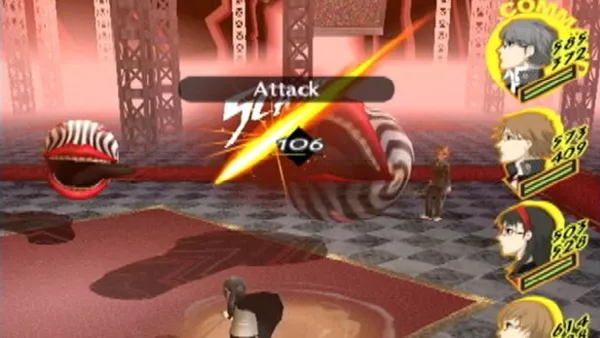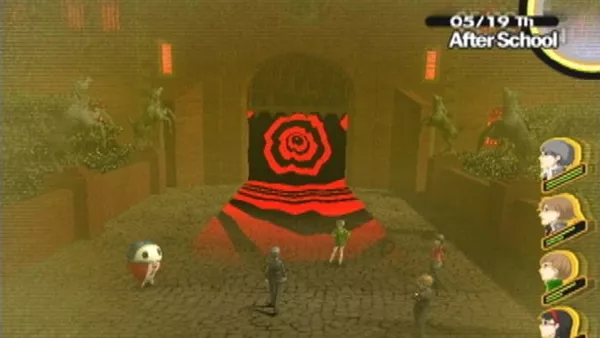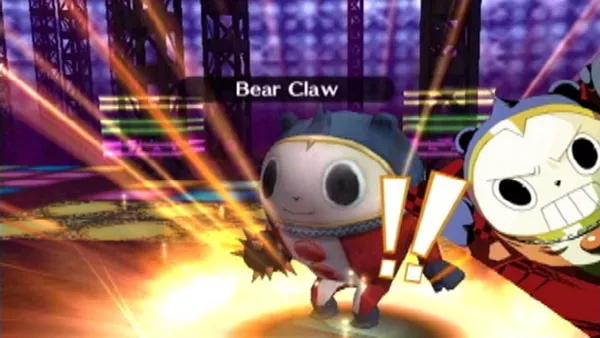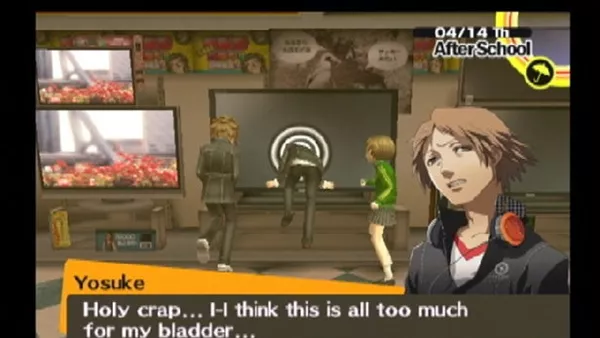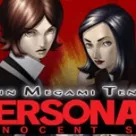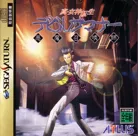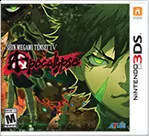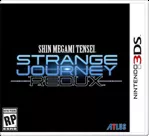Shin Megami Tensei: Persona 4
Description official descriptions
Recently, strange murders began to occur in the quiet Japanese town Inaba. People are found dead under mysterious circumstances, and rumors say that something very wrong is going on with local TV system. A high school student moves into town, living at the house of his uncle, a police detective named Ryotaro Dojima. Shortly after his arrival, a TV announcer is found dead, her body hanging on a TV antenna. A while later, the student who discovered the victim is found dead as well. The new student and his friends accidentally discover that a parallel world exists within the realm of television, populated by supernatural creatures known as Shadows. The young people also find out that their own Shadow Selves are able to grant them unique powers. They must travel into that mysterious world and find out who is responsible for the murders.
Persona 4 is a Japanese-style role-playing game with light social simulation elements, similar in concept to its predecessor. The player controls a party of characters who must solve the crimes by venturing into the TV world and exploring its dungeons. Each dungeon is associated with a potential victim and carries a unique theme; their layouts, however, are randomly generated. Enemies are visible on screen, and contact with them leads to turn-based battles, which heavily rely on exploiting enemy weaknesses and unleashing powerful attacks after having successfully knocked them down. As opposed to the previous game, the player can issue direct commands to the main character's companions during battles. Similarly to other Persona games, characters' abilities and attributes change by merging them with supernatural beings known as Personae, which can also be fused at special locations to create more powerful ones.
Like the previous installment, the game is stretched across an entire school year, strictly following a real calendar, each day divided into different periods (school, after school, evening, etc.). The protagonist can interact with other characters, study, join clubs, take part-time jobs, etc. Spending time with characters builds up Social Links, which grant the player benefits when creating new Personae, unlock skills for companions, and increase the protagonist's own attributes (Understanding, Diligence, Courage, Knowledge and Expression); these attributes, in turn, influence further interaction and character-building.
Spellings
- ペルソナ4 - Japanese spelling
Groups +
- Console Generation Exclusives: PlayStation 2
- Gameplay feature: Creature breeding / fusion
- Gameplay feature: Multiple endings
- Gameplay feature: New Game+
- Games made into comics
- Games made into TV series
- Megami Tensei / Megaten universe
- Middleware: CRI
- Persona series
- Setting: Future now past
- Theme: School
Screenshots
Promos
Videos
Add Trailer or Gameplay Video +1 point
See any errors or missing info for this game?
You can submit a correction, contribute trivia, add to a game group, add a related site or alternate title.
Credits (PlayStation 2 version)
211 People (204 developers, 7 thanks) · View all
| Director | |
| Art Director | |
| Composer | |
| Chief Planner | |
| Scenario & Social Link Planning Leader | |
| Scenario Writer | |
| Event & System Planning Leader | |
| Event Planner | |
| Event Sub Planner | |
| Social Link Event Planner | |
| Social Link Event Sub Planner | |
| Battle & Field Planning Leader | |
| Battle Planner | |
| Battle Sub Planner | |
| Chief Programmer | |
| Battle Programmer | |
| [ full credits ] | |
Reviews
Critics
Average score: 90% (based on 40 ratings)
Players
Average score: 4.0 out of 5 (based on 39 ratings with 2 reviews)
Great for fans of the genre, but too tedious and difficult for others.
The Good
Game mixes anime with video games brilliantly, especially in the insanely beautiful cut-scenes.
The amount of time you'll spend reading dialogue or watching scenes unfold actually does make the story rather fun. It feels like a show without commercial breaks.
Characters can be related to.
Voice-acting.
You have to carefully manage how you spend each day.
Building social links is a pretty entertaining feature.
The Bad
Two hours of playing, five minutes of actual gameplay.
Game takes a very sudden leap of difficulty that doesn't match well with the timed narrative.
Even after gameplay starts becoming more present, I still feel like the game drags me through most of the time.
The main character
Very tedious and monotonous.
The Bottom Line
Story
Persona 4 is a very story-heavy RPG in which you take control of a transfer student in modern Japan. You arrive in the new town and move in with your uncle and younger niece, the former of which is a detective. Soon after your arrival the town is struck by a series of murders, leaving the townsfolk shocked and the police confused. Your character is however told through a dream that he has the power to solve these murders, power in this case meaning that he can go pass through any television and arrive in a different world. The world within the TV turns out to be connected to the murders, so you are forced to team up with a cast of different characters and solve the mystery yourself.
What really sets this game apart from other JRPG-games is the timed narrative and characters. The long-term goal is to solve the mystery and prevent characters from been killed in the TV-world, but you also need to maintain a social and school life at the same time. This means that your short-term and long-term goals conflict and you are occasionally forced to make choices. For example: you have four days to save a character from the TV-world, but you also have to attend to your clubs on two of those days. In that scenario your social needs cut down on the time you have to save the character. You could of course skip on going to your clubs, but going there improves your “social links” which allows you to create new personas (read: attack styles). Even if you don’t have to save anybody, then you still need to decide between improving your social links (going to clubs and hanging out with friends), your own skills (which give new dialogue options) or just grinding your attack-styles to higher levels. At this point the timed narrative can get a bit frustrating, as the game has the tendency to throw events into your direction. This means that your plans on doing a specific task are halted by the chance to attend a one-time event. This wouldn’t be too bad, if it didn’t happen constantly.
The aforementioned characters are also a joy to behold because they are so well-written. Most of the time I feel very cold towards anime, solely because they usually involve people with such elaborate backstories and personalities. It makes it impossible for me, as the audience, to relate to the character on-screen and thus I’ll lose interest much faster or get frustrated over smaller issues. The characters in Persona however do have interesting stories behind them, but they are just regular kids. This game takes ordinary and relatable traits and manages to make them fascinating. I even felt like I knew what the characters were going through from time to time. The world inside the TV is also themed after whatever character is trapped there at the moment, so this title also serves as an exploration of each person’s deepest thoughts and wishes, which is another thing I really like and would love to see done more often. In the midst of all this is you, the player, and sadly you are boring as all hell. It really strikes me as odd that Atlus decided to make a blank-slate because that only works in games like Doom or Half-Life where we can imagine ourselves how the character would react to situations. This guy simply gives too much away because we can see him react to certain situations, such as his natural poses when talking to people or the way he motions while speaking. He also falls very flat because there are more interesting people surrounding him, quite literally turning him into a third wheel wherever he goes.
Gameplay
Persona 4 has a fantastic story and one that I would love to see develop, but that desire is instantly put to rest when you notice what the core gameplay is made out of. During each rescue mission you’ll be placed inside a labyrinth themed after the character that is imprisoned there. Your goal is to fight your way through dozens of enemies and eventually reach the final room.Tthis wouldn’t be too big an issue, if the final room wasn’t eleven floors higher than you are. Each floor of the maze also consists of randomized hallways and rooms, but all of them have the exact same scenery and pattern, so not only is the maze boring, but it also starts to wear on you very fast. Because of the randomized nature, you can never really get a feel for the logic either. Sometimes the staircase was right around the corner and sometimes at the end of eight branching paths. Each time you leave the maze it gets shuffled again too, which is another annoying feature.
Aside from been in no way compelling, making your way through the maze can also be ridiculously difficult. I made sure that I was always three levels above the recommended and I had to reload a save about three or four times per level (boss-fights included). As you make your way through the maze you’ll be harassed by a number of enemies, you can try to hit them in the back in order to get a preemptive strike (if they hit you in the back, then the fight will start with them). This is a useless feature because the fights start with you by default, so you might as well run into them and not risk giving them the first strike. Each enemy has a set of elemental strengths and weaknesses, if you hit a weakness then the enemy is stunned, but if you hit a strength, then the attack can be absorbed, heal or even deflect back at you. It sounds tactical, but the problem is that the game constantly switches to new enemies or even old ones with a different name. This meant that there was no real way to create a set of tactics or even an ideal team, unless you’d go back to grind later on. The boss-fights are also terrible and already the very first real one spawned additional enemies to help her and those enemies also used healing abilities. That would be cruel to put in nearing the end of the game, let alone the first boss.
Things are a lot better outside of the TV where most of the social side-stories are going on. You have to find a way to spend each of your days in the town of Inaba, so this means discovering its secrets, picking up mini-quests or improving your aforementioned social skills (characteristics). The mini-quests reminded me a lot of Fallout 3, just because they aren’t marked and you’ll actually have to ask around and search for them. I found some of them to fairly entertaining, but the real joy still comes from seeing the main story or social links advance. You can also stock up for your next journey by buying items and weapons in the shopping district or visit a special room where you can combine your personas and create newer, more powerful ones.
Presentation
Persona 4 has two different sets of graphics: one of them is the downright amazing animated cut-scenes and the other is the somewhat underwhelming gameplay graphics. During cut-scenes you’ll be shown visuals that could instantly be lifted and placed into an anime instead, even some more modern cartoons I have seen don’t look as great as this Playstation 2 title. It’s therefore kind of a shame that the game uses these scenes very sparsely and more often than not relies on the actual graphics, even during non-playable dialogue. These visuals are certainly not bad by any means, but they don’t really impress either. The problem is that characters don’t really emote well; they just get some animations like a pulsating # or a tacked-on blush. Movements are also very stiff, so most of the time I found myself staring at the pictures that accompany the dialogue instead of what was actually happening on the other 85% of the screen.
Luckily the voice-acting compensates for a lot of the presentation’s flaws and I’d even say that it was part of the reason I stayed hooked to the game. Unlike Kingdom Hearts, Persona always uses voice-acting, except for repetitive lines and the social-links’ dialogue-trees (whereas Kingdom Hearts randomly turned the voice-acting on and off). The voices of the actors perfectly matches the characters we see on-screen and they are almost all done professional, which is especially nice for a Japanese title. It also makes me really happy that this great voice-acting hasn’t been wasted on a terrible script either.
I have already talked about the level-design, but I think it’s worth repeating that it’s really bad. All the levels consist of the exact same hallways and rooms that get copy-pasted in a random order, so there is nothing engaging about the design at all. Only a few set rooms have something related to the story going on, but the rest of the time it’s literally a monotone maze. It’s not really encouraging to the player when the only difference between level 1 and 2 (besides a change of theme) is that level 2 had three more floors to deal with.
Replay-value
While playing this game I got a bit interested in how long this game lasted other players and I was shocked to find that players reported hours ranging from 75 to 110. I am going to be honest with you and say that I have NEVER played a game that lasted this long (aside from sandbox titles). It would take a true fan to ever willingly play through an entire ninety-hour long, semi-linear RPG twice. I am not one of those.
While the story would definitely warrant another playthrough, it’s the gameplay that really ruins it. I once again can’t stress enough that making each level a multi-layered maze (with randomized paths and the exact same scenery all throughout) was just stupid and I can’t believe that nobody at Atlus opposed this horrible design. If there is one thing that kills replay-value, then it would be dull repetition. Would you replay a game if you knew it consisted roughly fifty hours of navigating obnoxiously designed mazes after you have gone through it already? No amount of atmosphere, story or free pancakes can convince you to sit through THAT again.
It’s a shame about the story though. As I played through this game for the first time, I already started fantasizing about what I could see if I had taken my character in a different direction. I barely spent any time with the character of Yukiko or Doshima, so I wondered what I could have discover about them if the tight time-schedule didn’t limit the amount of time I could spend on developing social links. What would happen if I pursued a different relationship, club or job? It even goes into the statistics, because having a courageous character can offer you completely different dialogue options than when you have an understanding character. It far surpasses games like Skyrim or Oblivion where the RPG-elements are mostly built around achieving the same goals in different ways. Instead of that Persona 4 offers completely different story-lines, which is a much better incentive than knowing you could have persuaded a character in giving you the key that you just pickpocketed.
Extras
I have no idea.
Verdict
Persona 4 reminded me a lot of Deadly Premonition while I was playing it: You either see the game as a work of absolute art that renders all its flaws meaningless or you see it as wasted potential. Sadly I have to take up residence in the latter camp, because Persona 4 is flawed at the very core of its gameplay design and not just all-around rough. The very foundation of how the programmers decided to make this game was just flat-out wrong and because of that, all the story and characters that the writers poured their soul into are wasted. I’ll definitely take a peek at that anime I hear a lot about, but as a game Persona 4 is an intriguing visual novel that occasionally pisses itself for three hours straight.
If it were just a series of dialogue trees with minimal player-involvement, then that would have been fun, if a little weird for a Playstation 2 game. Perhaps they could have done more with the animated cut-scenes we occasionally get to see or maybe they could have actually made the Beginner difficulty for beginners (why don’t we have cheats in videogames anymore?). It’s too late to complain though, so my final word will be that Persona 4 is an excellent game for veterans of the genre, but not for anybody else.
PlayStation 2 · by Asinine (957) · 2012
The Good
With the success of Persona 3, the sequel was inevitable, but the question remained: when? The fans of Atlus who were craving for another Persona game after completing the third one didn't have to wait long, because Atlus soon announced the fourth entry in their Persona franchise. As is the case with Persona 2, Shin Megami Tensei II, or even Soul Hackers and their prequels, P4 closely resembles Persona 3 and it's engine. In one hand, Atlus had the time to take P3's feedback into consideration, polish and streamline various elements which made Persona 3 excellent, on the other hand, the outcome in some ways is more of the same than a new experience, which could prove fatal for any game whose sequel is built on the groundwork that doesn't really lend itself to an extremely similar game if it doesn't want to cause a gamer fatigue and tiredness. Fortunately, Persona 4 has managed to avoid the fatal trap. That's not to say it's perfect, though.
One of the characteristics of Persona has always been teenage protagonists (except Eternal Punishment), and with P4 it's no different. Persona 4 employs the popular system first found in Persona 3 where you play a whole year as a high school sophomore. Every day is divided into three parts: day, afternoon, and night. Since you have no choice but to regularly attend classes, you can peruse your free time for extracurricular activities and socializing at afternoons and night, unlike P3, where you could hang out with friends or attend cultural/sports clubs only at afternoons. Building up your Social Links, the relationships you establish with various characters, is a pivotal part of the game. Balancing the exploration of TV World and a part-time job, hanging out with friend, or studies is a key to success in Persona 4, because S. Links grant you bonuses when you're fusing personae in Velvet Room. It's much more lax, and as a whole, P4 has a much better implementation of the social part of the game. Your friendships aren't so individual anymore, in P4 it's possible to spend time with multiple friends without wasting precious time.
TV World, the miraculous world of mysteries you get to explore in Persona 4. Abandoning the more apocalyptic tone of the third game, the plot of P4 revolves around a series of murders. After you've transferred to Inaba, horrible crimes start happening. Soon a rumour about Midnight TV, a mysterious TV channel, starts to spread. People say that when you watch the channel at midnight, it shows your future love. One day when you've got nothing better to do, you obviously check it out. By accident you find out that the screen of TV is not solid as common sense dictates, but hollow. Amazed by the discovery, you inform your newly made friends. Soon enough you find yourself in the depths of Midnight TV, where a mysterious teddy bear informs you of the other side. Having found out about the connection between the murders and the appearance of the channel, you have no choice but to venture into the depths of Shadow-infested multimedia land with your trusty friends, and thwart the killer's evil plans.
Needless to say, Persona 4's story is much more gripping than P3's. The game doesn't completely abandon the structure of P3. You still have to rescue people thrown into the TV regularly like you have to kill the bigger Shadows on certain dates in Persona, but the various dungeons you get to explore completely overshadow the mundane Tartaros of Persona 3. Persona 4 has much more events and as a whole, more meat to it's narrative than the previous game. There are twists (what would a detective story be without twists?), and in the end you have to make an important decision which totally changes the outcome of the story. The ending portion of the game is rushed, however, and as you'll soon find out in The Bad section, the true ending is obviously too obscure without a guide.
Personae subseries has never been grandiose in it's overall scope, and the plot has always been built on the relationships of different characters. P4 is no different. If the hunt for the bad guy is like two slices of bread, then the characters form the ingredients which make the overall package so delicious. Persona 4 tackles different issues by having the inner thoughts and subconscious of the characters manifest as physical spaces - dungeons - and in order to save the potential victims, they have to face themselves beforehand. It's difficult to spill the details without spoiling the greatest aspects of P4, but it's safe to say that Atlus undoubtedly tried their best to create persons with flaws, people who you could relate to. Characters are undoubtedly what make the overall story fit together.
Gameplay and battle system of Persona 4 aren't a massive overhaul from the previous game, but many excellent additions have been introduced in order to make the overall experience more accessible and comfortable. For example, there's a quick travel button, which allows you to instantly move from one place to another. You're on the 3rd floor of the school building, and don't feel like running all the way down in order to go to the city? No sweat, just push the square button, choose the location you want to access and you're there. I've saved tremendous amount of playtime, all thanks to the magical square button.
Battle system is very similar to Persona 3, which is already derived from PS2-generation of Megami Tensei games. Like SMT: Nocturne and P3, the battles are traditional turn-based affair, utilizing the iconic Press Turn System. You see, every enemy has a weakness to a particular element, and by exploiting it your character receives another turn. Enemy isn't the only one with weaknesses, your equipped Persona also influences your combat skills, weaknesses and resistances to various elements. This, along with the ability to make an all-out attack after knocking down every enemy (again, by exploiting their weaknesses), makes the battles of P4 much more tactical than other JRPGs. Here status affecting spells actually make a difference, and by skillfully managing your arsenal of Personae, you'll never have to grind like a madman. P4 also lets you control your party members directly, while still allowing the computer to take the helm (I personally find it useless, in P3 it wasn't much of an issue since the whole game was balanced to fit AI-controlled party members, but in P4 you'll only exhaust your resources, or make dumb moves). Advancing through party member's S. Link has a bigger impact on the actual gameplay now. By building a strong relationship with playable characters, they'll get various special skills in battles. They can help you recover from a knock-down attack, perform powerful special moves or, in critical moments, make a dash and protect you from a fatal blow.
Post-battle shuffles don't give nothing but Personae cards and if you're lucky, a bonus arcana card. This makes it much tougher to survive in the dungeons, but on the other hand, your characters don't get tired anymore, and you can explore the dungeons as long as you want. That doesn't mean it's piece of cake, without health shuffle cards you're going to have a tough time if you plan on ascending to the top of the dungeon in one run. Dungeons are also much more shorter, consisting most of the time only of 10-11 floors and ending with a boss. After you've cleared the dungeon, you can always come back and it's not like you don't have a good reason - in the second runthrough a special boss appears on the last floor and while optional, it's recommended that you take that and all the other special bosses down.
Shadows, the monsters you'll have to face, are all similar to their "colleagues" in P3, and once again, have been drawn in the surreal style so characteristic to Megami Tensei games. Being a spiritual sequel to P3, P4 has a similar art direction. The more bleak, gloomy, and almost oppressive atmosphere of P3 has been traded for rural landscapes, suffocating fog and the yellow menu design. Graphics stay true to the "anime" style of P3 and that's one of the saving graces of the art design. Yes, P4 isn't technically advanced as most of the big players like FFXII, God of War, or Shadow of Colossus, but it doesn't need to be. The gorgeous art direction more than makes up for the shortfalls in the technical department.
In your free time, you've got more options to spend your time than in P3. You can try fishing, take a part-time job, read books, take part of special events with your friends, cook, and more. It's tempting to call them superficial and nothing more than actions you can't really participate in, but no. What makes the game really great is how everything is balanced and has just the right amount of depth. And in this case, you can't even criticize the game for pushing the dungeon-crawling part more than anything else, because in P4 the dungeons actually feel like a supplement to the "social simulation" part of the game.
Megami Tensei game have always been very experimental, even innovative with their contemporary (stylistically) soundtracks compared to other Japanese RPGs. It's no wonder, because traditional and classical elements just wouldn't work in the settings Atlus conveys in Megaten games. With PS2 era Shoji Meguro, a composer whose whole repertoire consists of soundtracks for Megami Tensei games, has taken pretty much over the music part of the games (for example, P1's soundscape is the work of 4 men, while Digital Devil Saga, Raidou Kuzunoha games, Persona 3 and Persona 4 are almost exclusively Meguro's solo work), and has consistently provided the imagery, action, and story of MT games with superb tracks. P4 isn't groundbreaking as his previous projects, but the overall synthesis of his best characteristics and musical strengths shine again in P4's soundtrack. If you were repulsed with the rap of P3, then you'll be glad to hear that there's no such "atonal barking" (not my opinion, of course) in this one. P4 is in many ways, similar to P3 with it's soundtrack, but also very different. P3's music perfectly captured the urban life of the game, and so does P4 to portray the mellow countryside. Yes, it has pop elements, but it's more laid-back, melancholic. There are vocal pop-rock songs, there are jazzy tunes and of course, Meguro's trademark melancholic rock with emotional guitar solos.
PS! My opinion on Meguro's works should never be taken as the most objective opinion, because he's my favourite musician (Yeah, I know I'm undermining my own review!).
The Bad
The story is not without problems, however. There are multiple endings, and while it's natural that bad endings don't offer much of a closure on the plot, it's absolutely absurd to hide the true ending from the player. Yes, hide. In order to get the true ending you have to make some unbelievably cryptic choices. The game actually lies to you so that you would miss the real ending with it's delicious revelations. I wouldn't be so upset about this if the normal ending was satisfactory. On the contrary, the slowly built tension reaches it's climax so fast that you're left wondering how it is even possible.
While the cast is made up of recognizable individuals, the JRPG staple of including a goofy or otherwise weird character in your party is at it again. In Persona 4 the android from P3 (who is actually one of the few out-of-this-world JRPG characters who doesn't tag along just to make lame jokes and shine with his idiotic humor) is replaced with a talking teddy bear Teddie. I'd have to spoil some important details about his character to explain my negative feelings towards that mess of a plushie, but I'll give you a hint: top-notch yaoi/slash fiction material. To make matters worse, his Social Link is the only imperative S. Link you have to advance.
As has been case with previous Megaten games, P4 isn't without some recycled content from the previous game. While I wasn't disappointed with the fact that there were no redesigns to Personae which have made their appearances in previous PS2-gen Megami Tensei games, and even extreme similarity to P3 didn't influence my overall opinion on the game in any way, it's still worth noting that P4 feels a lot like P3. So if P3 proved to be menial chore for you, don't bother!
The Bottom Line
In any case, Persona 4 is a very good product. The underlying mechanics of the game aren't very complex, and if you start examining them individually, you'd find a few flaws. This doesn't matter in the end, because as an unifying whole, the various elements of Persona 4 come together to form a fun experience. While "expert" Megami Tensei tend to criticise it just like Persona 3 for being shallower than the previous installments, it's still a good starting point for the wondrous world of Megaten, and even enjoyable for an open-minded veteran of the Personae series.
PlayStation 2 · by Donatello (466) · 2009
Discussion
| Subject | By | Date |
|---|---|---|
| This is different! | St. Martyne (3648) | Jan 7, 2009 |
Trivia
1001 Video Games
The PS2 version of Shin Megami Tensei: Persona 4 appears in the book 1001 Video Games You Must Play Before You Die by General Editor Tony Mott.
Awards
- GameSpy
- 2008 – PS2 Game of the Year
Analytics
Upgrade to MobyPro to view research rankings!
Related Sites +
-
Persona 4
Official website
Identifiers +
Contribute
Are you familiar with this game? Help document and preserve this entry in video game history! If your contribution is approved, you will earn points and be credited as a contributor.
Contributors to this Entry
Game added by Kyle W.
PlayStation 3 added by Fred VT.
Additional contributors: formercontrib, LordAndrew, Patrick Bregger, FatherJack.
Game added December 28, 2008. Last modified January 31, 2024.
